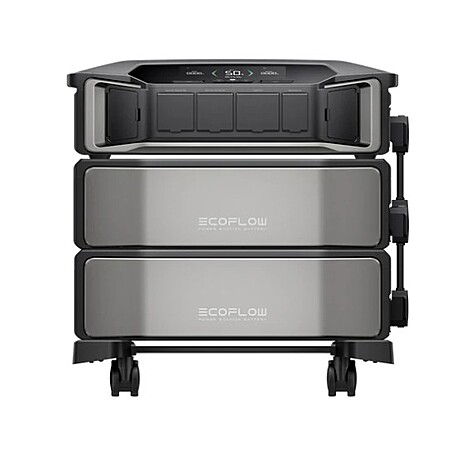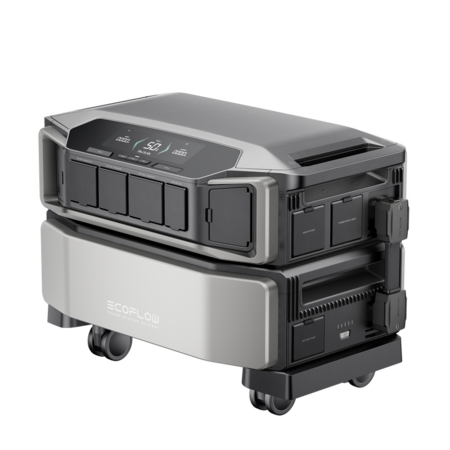Wellbots has
EcoFlow Delta Pro Ultra 12.3kWh 7200W PowerStation w/ 2x Expansion Batteries (EFDPUPCS-2-BP-FB) +
400W Solar Panel on sale for $5899 - $400 when you apply discount code
EF400DPU at checkout =
$5499.
Shipping is free.
Thanks to Staff Member
Skillful_Pickle for sharing this deal.
Features:- 6144 Wh/102.4V Battery Capacity
- 20Ah/3.2V Cell
- WiFi/4G w/ Bluetooth
- 6 AC Outlets 120V/240V/7200W Total
- UPS Port/Online UPS Port
- Includes
- EcoFlow Delta Pro Ultra Power Station
- 1 x 400W Solar Panel
- 2x EcoFlow Delta Pro Ultra Power Station Battery
- 4x EcoFlow M6*20
- 4x EcoFlow Side Mount Caster
- 2x EcoFlow Battery Connection Cable
- EcoFlow Supporting Leg
- EcoFlow Portable Stand
- EcoFlow C20 AC Charging Cable
- Includes 5-year manufacturer warranty w/ purchase





Leave a Comment
Top Comments
Simply use an L1 charger to charge the hybrid overnight and you will only have a single ~10% conversion loss and save yourself some money. On a 10 amp L1 charger (most L1 chargers seem to be in the 10-12 amp range), that's 1.2 kW/h. After factoring in the ~10% AC-DC conversion loss the hybrid's battery is getting ~1 kW/h. That means it would take no more than 12 hours to fully recharge the hybrid's 12 kWh battery, and less time if the battery wasn't fully empty.
I actually use a L1 charger for my EV when at home and have been fine, something I did not expect when I first got it. I tested using the DPU out of curiosity and confirmed that I can indeed charge the EV from it using an L2 charger, but have to make sure that the L2 charger is set to not pull too much power. Also, the DPU's charge switch must be set to charge in fast (1.8 kW) mode, not the configurable (slow) mode. Fast mode ensures the DPU will -never- pull more than 15 amps from the AC input (1.8 kW at 120 V). Configurable mode (what I normally use) allows you to set the charging cap to a lower level, but a side effect of the DPU's design is that it that mode it will potentially try to pull over 15 amps from the input if you are pulling a large amount of power out. I never tripped the main breaker, but I did trip the DPU's internal safety breakers a few times as the total power output ramped up beyond 1.8 kW and it tried to pull the corresponding amount from the input.
The gist of all that is that yes, you can plug in a L2 charger into a Delta Pro Ultra to charge your hybrid but you really shouldn't unless you want to waste your money. If it were an EV rather than hybrid it would still be a waste of money, but I can imagine a couple scenarios where it might be worth the added cost.
edit:
Side note: L2 charger can sometimes be used as an L1 charger
Disclaimer: I am NOT an electrician. The bit below is my experience and I DO NOT RECOMMEND that anyone else try it.
If you already have a plug-in L2 charger then you may be able to convert it to L1 simply by using a physical plug adapter. The vehicle side does not care if it gets 120 or 240 volts (by design it gets L1 + L2/N, meaning it can handle 120 or 240 volt automatically), but the EV charger control box might. If trying this then you also have to ensure that the L2 charger's amperage either is, or can be configured to be, under 15 amps.
I have a portable L2 charger with a 6-50 plug that lets me adjust the amperage, and I use it as a L1 charger with a physical 6-50R to 5-15P adapter. However, the L2 charger I bought allowed me to specify the plug type when I bought it, and 5-15 was an option, so I was pretty sure that the electronic bit would work at both 120 or 240 volts.
18 Comments
Sign up for a Slickdeals account to remove this ad.
Our community has rated this post as helpful. If you agree, why not thank Covvie
Simply use an L1 charger to charge the hybrid overnight and you will only have a single ~10% conversion loss and save yourself some money. On a 10 amp L1 charger (most L1 chargers seem to be in the 10-12 amp range), that's 1.2 kW/h. After factoring in the ~10% AC-DC conversion loss the hybrid's battery is getting ~1 kW/h. That means it would take no more than 12 hours to fully recharge the hybrid's 12 kWh battery, and less time if the battery wasn't fully empty.
I actually use a L1 charger for my EV when at home and have been fine, something I did not expect when I first got it. I tested using the DPU out of curiosity and confirmed that I can indeed charge the EV from it using an L2 charger, but have to make sure that the L2 charger is set to not pull too much power. Also, the DPU's charge switch must be set to charge in fast (1.8 kW) mode, not the configurable (slow) mode. Fast mode ensures the DPU will -never- pull more than 15 amps from the AC input (1.8 kW at 120 V). Configurable mode (what I normally use) allows you to set the charging cap to a lower level, but a side effect of the DPU's design is that it that mode it will potentially try to pull over 15 amps from the input if you are pulling a large amount of power out. I never tripped the main breaker, but I did trip the DPU's internal safety breakers a few times as the total power output ramped up beyond 1.8 kW and it tried to pull the corresponding amount from the input.
The gist of all that is that yes, you can plug in a L2 charger into a Delta Pro Ultra to charge your hybrid but you really shouldn't unless you want to waste your money. If it were an EV rather than hybrid it would still be a waste of money, but I can imagine a couple scenarios where it might be worth the added cost.
edit:
Side note: L2 charger can sometimes be used as an L1 charger
Disclaimer: I am NOT an electrician. The bit below is my experience and I DO NOT RECOMMEND that anyone else try it.
If you already have a plug-in L2 charger then you may be able to convert it to L1 simply by using a physical plug adapter. The vehicle side does not care if it gets 120 or 240 volts (by design it gets L1 + L2/N, meaning it can handle 120 or 240 volt automatically), but the EV charger control box might. If trying this then you also have to ensure that the L2 charger's amperage either is, or can be configured to be, under 15 amps.
I have a portable L2 charger with a 6-50 plug that lets me adjust the amperage, and I use it as a L1 charger with a physical 6-50R to 5-15P adapter. However, the L2 charger I bought allowed me to specify the plug type when I bought it, and 5-15 was an option, so I was pretty sure that the electronic bit would work at both 120 or 240 volts.
Also, for me to have a some solution that also allows me to charge my EV, what would you recommend?
Sign up for a Slickdeals account to remove this ad.
Also, for me to have a some solution that also allows me to charge my EV, what would you recommend?
You will see loss when the eco flow inverter converts DC to AC and then your car inverter taking the AC back to DC.
What type of solution do you need? Do you mean charging if your power goes out?
Also, for me to have a some solution that also allows me to charge my EV, what would you recommend?
Start with the level 1 plug since a 12 kWh hybrid battery can easily be recharged overnight using a level 1 adapter, then convert to level 2 at a later point if you want or need to.
You will see loss when the eco flow inverter converts DC to AC and then your car inverter taking the AC back to DC.
What type of solution do you need? Do you mean charging if your power goes out?
Powering my EV isn't the main goal, but I do want a system that can handle as much of my current grid usage as possible. That way, it helps with daily savings while also giving me emergency power if the grid goes down, including the option to top off my EV if needed, although that will most likely never need to happen.
My EV is a Model 3 Performance, and I am using a Tesla wall connector. I drive 20-25 miles a day through the work week, all highway, at 85mph, in case any of that helps.
Sign up for a Slickdeals account to remove this ad.
Leave a Comment